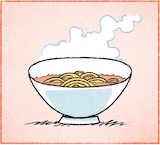
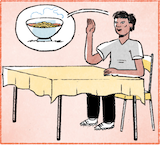
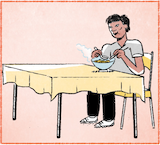
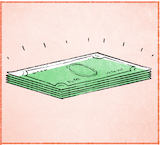
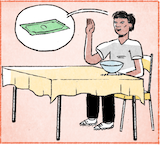
นี้คืออี่หยัง นี้คือกวยเตียว
บางคนสิมักกินกวยเตียวแทนเข้า
กวยเตียวเส้นอี่หยัง กวยเตียวเส้นน้อยๆ เส้นสีเหลียง
กวยเตียวอยู่ในอี่หยัง กวยเตียวอยู่ในถ้วย อยู่ในถ้วยมีกวยเตียวบักหลายหนึ่ง หลายบักคักหนึ่ง
มีน้ำกวยเตียวหลายบ่ หลายอยู่ มีหลายบักคักหนึ่ง เกียบเต็มถ้วยเอาโลด
ถ้วยกวยเตียวใบใหญ่บ่ บ่ ถ้วยกวยเตียวใบบ่ใหญ่ ถ้วยกวยเตียวใบพอดี
ถ้วยสีอี่หยัง ถ้วยใบสีฟ้า
กวยเตียวแซบบ่ บ่ลู้คือกันจักแซบหลือบ่แซบ บ่ได้กินเบิ่ง เบิ่งซงแล้ว เป็นตาแซบอยู่
2
เขากำลังเฮ็ดหญัง เขากำลังสั่งกวยเตียว
พุซายคนนี้ เขาอาดสิหิวเข้า เขากะเลยสั่งกวยเตียวเพื่อที่สิเอามากิน เพาะว่าเขาหิวเข้า
พุซายคนนี้ เขามาพุเดียว เขานั่งอยู่พุเดียว เขาบ่มีหมู่เลย เขาอยู่พุเดียว
เขานั่งอยู่ใส เขานั่งอยู่เทิงโต่ะ นั่งอยู่เทิงโต่ะในล้านอาหาน ในล้านแนวกิน
เขาญกมือขึ้นพ้อม เขาญกมือขึ้นเพื่อที่สิสั่งแนวกิน มือข้างหนึ่งเขาวางอยู่เทิงโต่ะ
ผ้าปูโต่ะสีเหลียงแม่นบ่ แม่น ผ้าปูโต่ะสีเหลียง ผ้าปูโต่ะวางอยู่เทิงโต่ะ
3
เขากำลังเฮ็ดหญัง เขากำลังกินเข้า
เขากินกับกวยเตียวแม่นบ่ แม่น เขากินกับกวยเตียว
เขากินแซบบ่ บ่ลู้คือกันจักแซบหลือบ่แซบ
ในมือของเขาใส่อี่หยังอยู่ ใส่ตะเกียบแม่นบ่ แม่น ในมือของเขาข้างหนึ่งใส่ตะเกียบอยู่ ในมือของเขาอีกข้างหนึ่งใส่ซ้อน
เขาใส่เกิบมาบ่ ใส่มาอยู่ เขาใส่เกิบคู่สีขาว เป็นเกิบโบกคู่สีขาว เขาใส่มาสองกิ่ง
ผมของเขาสีอี่หยัง ผมของเขาสีดำ ผมบ่ญาวหลาย ผมสั้นๆ
4
นี้คืออี่หยัง นี้คือเงิน
เงินคืออี่หยัง เงินสามาดซื้อได้ทุกอย่าง สามาดใซ้จ่ายได้ทุกอย่าง
ขั้นบ่มีเงิน กะซื้อของบ่ได้
เงินอันนี้เป็นแบ้งหลือเป็นเหลียน เงินอันนี้เป็นแบ้ง บ่แม่นเหลียน
เงินเหลียนกะสิเป็นเหล็ก หลือเป็นเหลียน ขั้นเงินแบ้งกะเป็นกะดาด
เงินแบ้งมันขาดได้บ่ ขาดได้อยู่ เพาะว่าเงินแบ้งมันเป็นกะดาด มันสามาดขาดได้
ขั้นคนสีกเงินแบ้ง เงินแบ้งกะสิขาด บ่สามาดใซ้งานได้เลย
แล้วคนลวยมีเงินหลายบ่ มีหลายอยู่ คนลวยหลายกะมีเงินหลาย คนลวยหน้อยกะมีเงินหน้อย ขั้นคนจนกะบ่มีเงินเลย หลือมีเงินหน่อยเดียว
5
เขากินเข้าแล้วไป่ แล้วๆ เขากินเข้าแล้วๆ
เขากินเบิดบ่ เบิดอยู่ ในถ้วยบ่ญังอี่หยังเลย เขากินเบิดคักเบิดแน่ เกี้ยงมิ่นลิ่นอยู่
เขากินอิ่มบ่ อิ่มอยู่ เบิ่งซงแล้วคือสิอิ่มหลาย แนวกินอยู่ในถ้วยบ่ญังเลย บ่เหลียอี่หยังจักอย่าง
เขากินแล้วๆ เขาสิจ่ายเงินบ่ จ่ายอยู่ เขากินแล้วๆ เขากะสิเอิ้นคนมาเก็บเงิน แล้วเขากะจ่ายเงินกับคนเก็บเงิน
แนวกินที่เขากินถืกหลือแพง บ่ลู้คือกันจักถืกหลือแพง บ่ฮู้ลาคา
ขั้นเขากินถืก เขากะจ่ายถืก ขั้นเขากินแพง เขากะจ่ายแพง
Link to overview page
Link to dictionary
| Isaan | Pronunciation | Tones | Thai | English/Notes |
|---|---|---|---|---|
| นี้ | ni: | HF | นี้ | 1. this 2. here |
| คือ | khʉ: | HR | คือ | 1. to be, to resemble, like, as 2. why {บักหล้าคือบ่เก็บโต่ะแน่ = [addressing a young boy] Why haven't you cleared the table?} |
| อี่หยัง | i:-yaŋ | H-M | อะไร | 1. what {นี้คืออี่หยัง = What is this?} {มื้อนี้เจ้าเฮ็ดอี่หยัง = What are you doing today?} {กินเข้างายกับอี่หยัง = What did you have for breakfast?} 2. something, anything, (in negations) nothing {บ่ต้องเฮ็ดอี่หยังอีกเลยนอกจากใส่ปุย = [we] don't need to do anything besides adding fertilizer} |
| กวยเตียว | gu:ai-ti:ao | M-M | ก๋วยเตี๋ยว | kind of noodle soup Notes: pronunciation: often with rising tones, especially in isolation |
| บาง | ba:ŋ | M | บาง | 1. some {สัดบางโตบ่มีขา = some animals don't have legs} {บางคนสิมักกินกวยเตียวแทนเข้า = some people like to eat noodle soup instead of rice (dishes)} {บางสิ่งบางอย่าง = something, anything} 2. thin |
| คน | khon | HR | คน | person, people |
| สิ | si | M | จะ | future tense auxiliary {เขากำลังสิตื่น = he's about to wake up} {สิไปตะหลาด = [I'm] going to the market} |
| มัก | mak | H | ชอบ | to like, to love, to want, to desire |
| กิน | gin | M | กิน | to eat, to consume, to use |
| แทน | thɛ:n | HR | แทน | 1. to replace 2. instead of |
| เข้า | khao | LF | ข้าว | rice {กินเข้า = to eat} {ปูกเข้า, เฮ็ดเข้า = to grow/plant rice} {เกี่ยวเข้า = to harvest rice} {กับเข้า = courses eaten with rice} |
| เส้น | sen | LF | เส้น | 1. string, thread 2. line 3. clf. for noodles, strings, threads, lines |
| น้อย | nɔ:i | HF | น้อย | 1. few, little 2. small |
| สี | si: | M | สี | 1. color 2. colored pencil, crayon |
| เหลียง | li:aŋ | M | เหลือง | yellow |
| อยู่ | yu: | H | อยู่ | 1. to be (located) at 2. yet, still 3. auxiliary indicating continuous or progressive action {ทอดปาอยู่ในกะทะ = (in the process of) frying a fish in the pan} {แม่กำลังเมี้ยนเฮียนอยู่ = mother is cleaning/tidying up the house} |
| ใน | nai | HR | ใน | in, within |
| ถ้วย | thu:ai | LF | ถ้วย | small bowl |
| มี | mi: | HR | มี | 1. to have 2. there is |
| บัก | bak | M | 1. intensifier before adjectives {ปาโตบักใหญ่ = a (very) large fish} 2. prefix in front of fruits and vegetables {บักแตงโม = watermelon} 3. can be used as a reference for a male person of the same or younger age {บักอันนี้ = this lad} |
|
| หลาย | la:i | M | เยอะ, มาก | many, much, very |
| หนึ่ง | nʉŋ | H | หนึ่ง | 1. one 2. after adjective: intensifier {บักคักหนึ่ง = very much} {อันบักใหญ่หนึ่ง = very large}, or attenuates the meaning {กะดาดมันแผ่นน้อยๆ หนึ่ง = the piece of paper is [relatively] small} |
| บักคักหนึ่ง | bak-khak-nʉŋ | M-H-H | intensifier: very, very much (variant of คัก) | |
| น้ำ | na:m | HF | น้ำ | 1. water 2. drink, soft drink, juice |
| บ่ | bɔ: | H | ไม่ | 1. no, not 2. question particle, transforming a statement into a question Notes: spelling exception in line with common usage on social media |
| เกียบ | gi:ap | LF | เกือบ | nearly, almost |
| เต็ม | tem | M | เต็ม | full |
| เอาโลด | ao-lo:t | M-HF | เอาเลย, ทำเลย, จริงๆ | in final position: intensifier {โตส่ำกะทะเอาโลด = [a fish] as large as the pan!} {เกียบเต็มถ้วยเอาโลด = the bowl is almost full!} {ทะนาคานมันสิไปตั้งไว้อยู่ซู่หม้องเอาโลด = banks are everywhere!} |
| ใบ | bai | M | ใบ | 1. leaf {ต้นไม้มีใบสีเขียว = the tree has green leaves} 2. banknote {เทิงมีใบพ้อม เทิงมีเหลียนพ้อม = there are notes as well as coins} 3. clf. for leaves, bank notes, helmets, bowls, jars, pots, boxes {ใบบัว = lotus leaf} {ก่องใบน้อย = a small box} {หม้อใบนี้มีฝาพ้อม = the pot here has a lid, too} {ถ้วยใบสีแดง = a red bowl} |
| ใหญ่ | ɲai | H | ใหญ่ | large, big |
| พอดี | phɔ:-di: | HR-M | พอดี | 1. to fit well 2. appropriate, just enough, just right {กะจกบานบ่ใหญ่ กะจกบานพอดี = not a large window, just right} {พอดีมือของเฮา = just right for his hand} 3. just in time, at the right moment, just this moment {แล้วพุซายคนนี้กะญ่างมาพอดี = and the man has come just now} |
| ฟ้า | fa: | HF | ฟ้า | 1. sky {เคี่ยงบินมันกำลังบินขึ้นฟ้า = the airplane is taking off into the sky} 2. color: blue |
| แซบ | sɛ:p | HF | อร่อย | 1. food: tasty {กวยเตียวมันแซบบ่ = Is the noodle soup tasty?} 2. sleep: well {เป็นตานอนแซบคัก = it looks as if she's sleeping very well} |
| ลู้ | lu: | HF | รู้ | 1. to know 2. to understand Notes: equivalent to ฮู้ |
| คือกัน | khʉ:-gan | HR-M | เหมือนกัน | 1. also, likewise, similarly {ยินดีที่ได้ฮู้จักคือกันคับ = Nice to meet you too!} 2. in negative sentences: either {บ่ลู้คือกัน = I don't know either} {จักคือกัน = I don't know (either)} |
| จัก | jak | M | จัก | 1. answer to a question: [I] don't know, don't know exactly, [I'm] not sure {พุซายคนนี้เขาเถ้าไป่ จัก จักเถ้าหลือบ่เถ้า เบิ่งบ่ค่อยออก = Is this man here already old? I don't know. I can't see clearly whether he's old or not.} {เขาเว้ากันอยู่ใส จักคือกัน = Where are they talking? I don't know either.} 2. exact(ly), what exactly {จักต้มอี่หยังกะบ่ฮู้ = I don't know what (exactly) he is cooking} {บ่ลู้คือกันจักปาอี่หยัง = I don't know either what kind of fish this is} 3. how much/many? {ต้นไม้มีจักต้น = How many trees are there?} {ตอนนี้จักโมงแล้ว = What time is it now?} {มือของเฮานี้สิมีจักนิ้ว = How many fingers do our hands have?} 4. a bit, a little bit {จักหน่อย/จักหน่อยหนึ่ง = a bit, a little bit} |
| หลือ | lʉ: | M | หรือ | or |
| ได้ | dai | HF | ได้ | 1. can 2. to get, to obtain 3. before verb: indicating past tense 4. บ่ได้ + verb: not |
| เบิ่ง | bəŋ | H | ดู | 1. to look at, to see, to watch {เบิ่งโทละทัด = to watch TV} {เบิ่งหนัง = to watch a movie} 2. to guess {เบิ่งซงแล้ว ... = [I] guess / from what it looks like ...} |
| ซง | soŋ | HR | ทรง | 1. shape, form 2. as if, like Notes: translation to be confirmed |
| แล้ว | lɛ:o | HF | แล้ว | 1. finished 2. already 3. and then, and next (especially แล้วกะ) 4. auxiliary for past tense |
| เป็น | pen | M | เป็น | 1. to be, to exist 2. to be able to 3. to suffer, sth. happens to 4. เป็นหญัง[...]คือ in initial position: why? {เป็นหญังเขากะคือแปงฟัน = Why is he brushing his teeth?} {เป็นหญังเคี่ยงบินมันคือสิตก = Why is the airplane falling down?} |
| ตาแซบ | ta:-sɛ:p | M-HF | น่ากิน | 1. tasty looking, to be appetizing 2. to be sleeping well {นอนเป็นตาแซบหลาย = [he's] sleeping well} |
| เขา | khao | M | เขา | personal pronoun: he, she |
| กำลัง | gam-laŋ | M-HR | กำลัง | auxiliary indicating continuous or progressive action |
| เฮ็ด | het | H | ทำ | to do, to make |
| หญัง | ɲaŋ | M | อะไร, เป็นหญัง = ทำไม | 1. what {เขากำลังเฮ็ดหญัง = What is he doing?} {ธูปเอาไว้เฮ็ดหญัง = What are incense sticks for?} 2. something, anything, (nothing) 3. เป็นหญัง[...]คือ in initial position: why {เป็นหญังเขาคือใส่บักพิกลงไปในกวยเตียว = Why is he putting chili in [his] noodle soup?} {เป็นหญังหน้าต่างมันคือเปิด = Why is the window open?} {เป็นหญังมันคือมีควนไฟ = Why is there smoke?} |
| สั่ง | saŋ | H | สั่ง | to order |
| พุซาย | phu-sa:i | H-HR | ผู้ชาย | man, male |
| อาด | a:t | LF | อาจ | 1. might, may, will 2. likely |
| หิว | hiu | M | หิว | hungry, to crave (food, water, sleep etc.) {หิวนอน = to be tired} {หิวน้ำ = to be thirsty} {หิวเข้า = to be hungry} |
| กะ | ga | M | ก็ | 1. then, consequently 2. also |
| เลย | lə:i | HR | เลย | 1. futher on, beyond, past {เข็มน้อยเลยเลขสิบสองไป = the minute hand has passed number twelve} 2. too much 3. at all 4. definitively 5. completely, utterly |
| เพื่อที่ | phʉ:a-thi: | H-H | เพื่อที่ | in order to, so that Notes: the vowel เอือ is likely to be a Thai loan |
| เอา | ao | M | เอา | to take, to give {เขากำลังเอาก่องไปซั่ง = he's taking the boxes to weigh them} {หมอกำลังเอายาให้คนป่วยกิน = the doctor is giving medicine to the patient} {เอาไว้ถ้า = is for, is used for, has the purpose of} |
| มา | ma: | HR | มา | 1. to come 2. auxiliary expressing action towards the present or focal time {กะคุเฮ็ดมาจากอี่หยัง = What is the bucket made of?} {แล้วเขากะเก็บเงินจากพุนั้นมา = and then she takes the money of that person} |
| เพาะว่า | phɔ-wa: | H-H | เพราะว่า | because |
| พุเดียว | phu-di:ao | H-M | คนเดียว | 1. alone, by oneself {เขากำลังยืนอยู่พุเดียว = she's standing by herself} {เขานั่งอยู่พุเดียว = he's sitting by himself} 2. one person |
| นั่ง | naŋ | H | นั่ง | to sit |
| หมู่ | mu: | H | หมู่, กลุ่ม(เพื่อน) | 1. group, friend(s) 2. children (in a family) {ลูกคนที่ออกมาก่อนหมู่ = the first-born child} {น้องสุดหมู่ = last-born child} 3. collective noun: group, many |
| ใส | sai | M | (ที่)ไหน | 1. where? {สิไปใส = Where are [you] going?} {มาแต่ใส = Where are [you] coming from?} {กะทะอยู่ใส = Where's the pan?} 2. somewhere, anywhere {ใสกะได้ = anywhere, wherever you like} |
| เทิง | thə:ŋ | HR | บน | 1. on, on top of, at, in {เทิงโต่ะ = at/on the table} {กบมันนั่งอยู่เทิงใบบัว = the frog is sitting on the lotus leaf} {เทิงท้องฟ้า = in the sky} {มันแล่นอยู่เทิงลาง = [the train] runs on rails} {มีคนนั่งอยู่เทิงลดสามล้อสามคน = there are three people sitting in the tuk tuk} 2. up, upward Notes: pronunciation: also realized as ทัง |
| โต่ะ | to | H | โต๊ะ, เก้าอี้ | 1. table 2. chair |
| ล้านอาหาน | la:n-a:-ha:n | HF-M-M | ร้านอาหาร | restaurant |
| ล้านแนวกิน | la:n-nɛ:o-gin | HF-HR-M | ร้านอาหาร | restaurant |
| ญก | ɲok | H | ยก | 1. to raise {ญกมือขึ้น = to raise the hand} {ญกโตอย่าง = to give an example} 2. to lift {เขากำลังญกก้อนหินขึ้น = he's lifting up the stone} |
| มือ | mʉ: | HR | มือ | 1. hand 2. front leg/paw (e.g., of a cat) |
| ขึ้น | khʉn | LF | ขึ้น | 1. to go up, to increase 2. sun: to rise {ตะเว็นกำลังขึ้น = the sun is rising} 3. more 4. bus/train etc.: to get on, to board {พุโดยสานขึ้นลดไฟเบิดแล้ว = all passengers have boarded the train} |
| พ้อม | phɔ:m | HF | พร้อม | at the same time, also, too {มีตะเว็นพ้อม = the sun's out, too} {กะทะมีด้ามพ้อม = the pan has also a handle} |
| แนวกิน | nɛ:o-gin | HR-M | อาหาร | food {เฮ็ดแนวกิน = to prepare food} {ตำบักหุ่งเนี้ยกะสิเป็นแนวกิน = papaya salad is (a kind of) food} |
| ข้าง | kha:ŋ | LF | ข้าง | 1. side {มีหูจับสองข้าง = there are handles on both sides} 2. next to {วางอยู่ข้างๆ ก่องใบใหญ่ = it's placed next to the large box} {เขายืนอยู่ข้างๆ อีกพุหนึ่ง = he's standing next to another person} 3. clf. for body parts which come in pairs (eyes, ears, legs etc.) {เขามีตาสองข้าง = she has two eyes} |
| วาง | wa:ŋ | HR | วาง | to place, to set/put down {โทละสับ/phone: วางสาย = to hang up} {มีเกิบวางอยู่ในก่อง = there are shoes in the box} {มือข้างหนึ่งเขาวางอยู่เทิงโต่ะ = he's put one of his hands on the table} |
| ผ้าปูโต่ะ | pha:-pu:-to | LF-M-H | ผ้าปูโต๊ะ | tablecloth |
| แม่นบ่ | mɛ:n-bɔ: | H-H | ใช่ไหม | question particle: ..., right? ..., isn't it? ..., don't you? etc. {เจ้าได้เห็นสิ่งนั้นแม่นบ่ = You've seen that, haven't you?} {ฝนกำลังตกแม่นบ่ = It's raining, isn't it?} {นี้คือกะคุแม่นบ่ = This is a bucket, isn't it?} |
| แม่น | mɛ:n | H | ใช่ | 1. yes 2. affirmative particle |
| กับ | gap | M | กับ | 1. and {ลุงกับป้า = uncle and aunt} {กวยเตียวหมูกับกวยเตียวไก่ = noodle soup with pork and noodle soup with chicken} 2. with, to {ค้ายๆ กับคำว่า ... = similar to the word ...} 3. prefix in front of foods {กับเข้า = side dishes eaten with rice} {เขากินกับกวยเตียว = he's eating noodle soup} |
| ของ | khɔ:ŋ | M | ของ | of, belonging to |
| ใส่ | sai | H | ใส่ | 1. to put something in/on {เขาใส่บักพิกในกวยเตียวหลาย = he's putting a lot of chili in his noodle soup} {เขาบีบยาสีฟันใส่แปงสีฟัน = he squeezes toothpaste on the toothbrush} {ก่องเอาไว้ใส่ของ = boxes are there to put stuff in} 2. to wear (clothes) {เขาใส่เสี้ยแขนญาว = he's wearing a long-sleeve} 3. directed at {เอิ้นใส่กัน = to call each other/to say to each other} {หมามันเห่าใส่แมว = the dog barks at the cat} {ล้องเพงใส่ไม = to sing into the microphone} {เขากำลังซี้มือไปใส่พุซาย = she's pointing at the man} |
| ตะเกียบ | ta-gi:ap | M-LF | ตะเกียบ | chopsticks |
| อีก | i:k | LF | อีก | 1. more, again 2. other, another |
| ซ้อน | sɔ:n | HF | ช้อน | spoon {เขาใซ้ซ้อนคนกาแฟ = he's stirring the coffee with a spoon} |
| เกิบ | gə:p | LF | รองเท้า | 1. shoe 2. general term for footwear |
| คู่ | khu: | H | คู่ | 1. pair, couple 2. to be paired with |
| ขาว | kha:o | M | ขาว | white |
| เกิบโบก | gə:p-bo:k | LF-LF | รองเท้าบูท | boot (footwear) |
| สอง | sɔ:ŋ | M | สอง | two |
| กิ่ง | giŋ | H | ข้าง | clf. for articles which come in pairs {เกิบคู่หนึ่งมีสองกิ่ง = a pair of shoes [consists of] two shoes} |
| ผม | phom | M | ผม | hair |
| ดำ | dam | M | ดำ | 1. black 2. to transplant rice seedlings {ดำนา = to transplant rice seedlings} |
| ญาว | ɲa:o | HR | ยาว | long |
| สั้น | san | LF | สั้น | short |
| เงิน | ŋən | HR | เงิน | money |
| สามาด | sa:-ma:t | M-HF | สามารถ | can, to be able |
| ซื้อ | sʉ: | HF | ซื้อ | to buy |
| ทุก | thuk | H | ทุก | every Notes: also pronounced ทุ as in ทุมื้อๆ = everyday, always |
| อย่าง | ya:ŋ | H | อย่าง | type, kind, sort, category |
| ใซ้ | sai | HF | ใช้ | to use |
| จ่าย | ja:i | H | จ่าย | to pay |
| ขั้น | khan | LF | เมื่อ | when, if |
| ของ | khɔ:ŋ | M | ของ | thing, object |
| อัน | an | M | อัน | 1. thing, object 2. general clf. for objects |
| แบ้ง | bɛŋ | HF | แบงก์ | bank note |
| เหลียน | li:an | M | เหรียญ | coin |
| บ่แม่น | bɔ:-mɛ:n | H-H | ไม่ใช่ | 1. not {เขาเป็นพุหญิง เขาบ่แม่นพุซาย = she's a woman, she's not a man} 2. no |
| เหล็ก | lek | M | เหล็ก | iron, steel, metal |
| กะดาด | ga-da:t | M-LF | กระดาษ | paper |
| มัน | man | HR | มัน | it (also used to refer to people) |
| ขาด | kha:t | LF | ขาด | 1. to be torn 2. to tear |
| สีก | si:k | LF | ฉีก | to rip, to tear |
| ใซ้งาน | sai-ŋa:n | HF-HR | ใช้งาน | to use, to put to use |
| ลวย | lu:ai | HR | รวย | rich |
| หน้อย | nɔ:i | LF | น้อย | 1. a little/some 2. not long |
| จน | jon | M | จน | 1. poor {คนจน = a poor person} 2. until, such that {เสียงดังเลี้ยยๆ จนคนสิลับ = (phone) it's ringing until [he/someone] answers the call} {ถ้าจน [...] = to wait until [...]} |
| หน่อยเดียว | nɔ:i-di:ao | H-M | นิดหน่อย | a bit, a little bit, not much Notes: see also หน่อยหนึ่ง |
| ไป่ | pai | H | หรือยัง | question particle: yet {เขาข้ามสะพานไป่ = Has he crossed the bridge yet?} {เขากินเข้าแล้วไป่ = Has he finished eating yet?} {กินเข้าไป่? บ่ทันกิน = Have you eaten yet? Not yet.} |
| เบิด | bə:t/bət | LF/M | หมด | 1. completely, totally, entirely {เทิงเบิด = all of them} {เบิดมื้อเบิดค่ำ = [all] day and night} {ขั้นพุโดยสานลงลดไฟเบิดแล้ว [...] = when all passengers have disembarked […]} {เขากินเบิดบ่ = Has he eaten all of it?} 2. to be finished, to be exhausted, to come to an end, to have no more {โน่ดบุ่กแบ็ดเบิด = the notebook is out of battery/the notebook needs recharging} |
| ญัง | ɲaŋ | HR | เหลือ | 1. to remain {ในถ้วยบ่ญังอี่หยังเลย = there's nothing left in the bowl} 2. still {ญังมีคนหลงเหลียอยู่ที่สิเฮ็ด = there are still people who do [this]} |
| คัก | khak | H | intensifier: very, very much | |
| แน่ | nɛ: | H | แน่, บ้าง | 1. some, somewhat 2. final particle, used to ask for examples (similar to Thai บ้าง at the end of a question) {หม้อใซ้เฮ็ดอี่หยังได้แน่ = What (different things) can a pot be used for?} {น้ำอัดลมซื้อได้อยู่ใสแน่ = Where/in which places can one buy soft drinks?} 3. final particle, when giving examples {มีเทิงส้งแน่ มีเสี้ยแน่ มีเกิบแน่ = there are trousers, shirts, shoes etc.} 4. final particle, used to give a command {ไปปิดหน้าต่างให้แน่ = Close the window!} 5. final particle, acting as an intensifier, especially in the pattern ... คัก ... แน่ {สูงคักสูงแน่ = very high} {ญ้องเฮาคัก ญ้องเฮาแน่ = [he's] praising me a lot} |
| เกี้ยงมิ่นลิ่น | gi:aŋ-min-lin | HF-H-H | หมดไม่เหลืออะไรเลย | nothing left |
| อิ่ม | im | H | อิ่ม | about food: to be full, to have enough |
| เหลีย | li:a | M | เหลือ | to remain |
| จักอย่าง | jak-ya:ŋ | M-H | (อะไร)สักอย่าง | something, anything {บ่สามาดแนมได้จักอย่าง = can't see anything} {บ่เหลียอี่หยังจักอย่าง = there's nothing left} |
| เอิ้น | ə:n | HF | พูด, เรียก | to call, to say {เอิ้นง่ายๆ ว่า = in other words} {คนอี่สานเอิ้นว่า เป็นลูกคนกก = Isaan people call her ลูกคนกก} |
| เก็บ | gep | M | เก็บ | 1. to collect, to gather, to accumulate, to pick/harvest {เก็บเงิน = to save money} {in a restaurant: เก็บเงิน = to get the bill} {เก็บน้ำ = to collect and store water} {เก็บผัก = to harvest vegetables} 2. to keep 3. to take in, to put away, to tidy up |
| ที่ | thi: | H | ที่ | 1. that, which {คนที่ยืนอยู่ฝั่งขวา = the person which is standing on the right = the person standing on the right} {เว้าคำที่บ่สุพาบ = to speak words which are impolite = to speak impolitely} 2. for ordinal numbers {ที่สาม = third} |
| ถืก | thʉ:k | LF | ถูก | cheap, inexpensive |
| แพง | phɛ:ŋ | HR | แพง | 1. expensive 2. dear |
| ฮู้ | hu: | HF | รู้ | 1. to know 2. to understand Notes: equivalent to ลู้ |
| ลาคา | la:-kha: | HR-HR | ราคา | price |